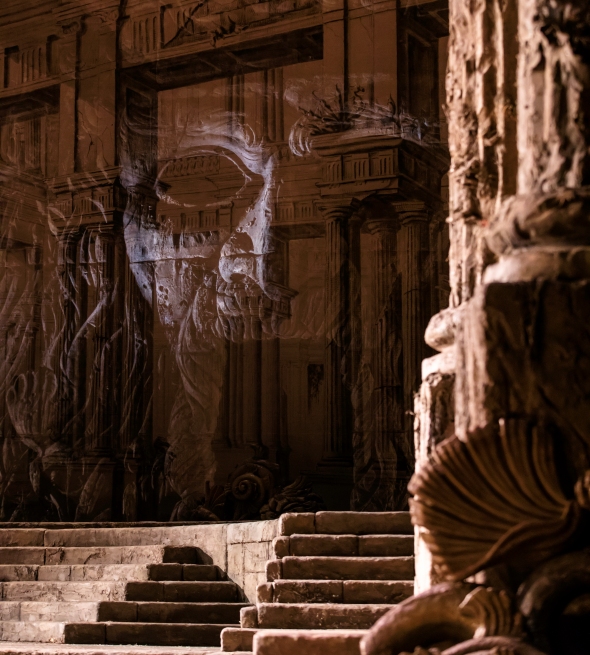‘Idomeneo’ at Lyric Opera: Strike gives way to stellar Mozart and new reign of euphoria
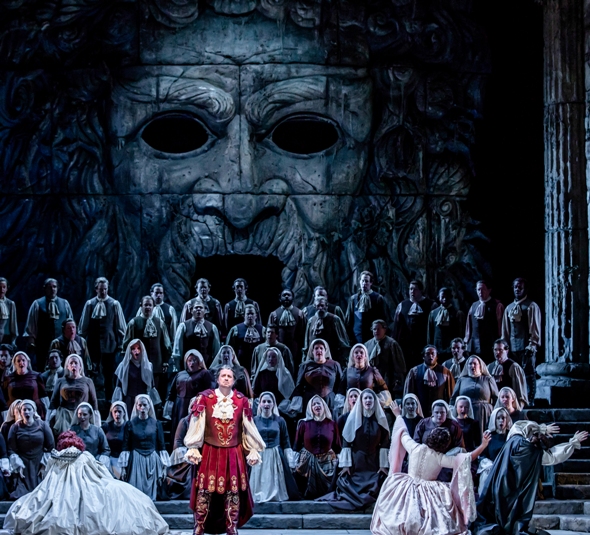
The Lyric Opera of Chicago debut of the 1982 Metropolitan Opera producton by the great Jean-Pierre Ponnelle stars Matthew Polenzani as the sorely tested King of Crete. (Photos Kyle Flubacker)
Review: “Idomeneo” by Wolfgang Amadeus Mozart, at Lyric Opera of Chicago, through Nov. 2. ★★★★
By John von Rhein
Grand opera is back on the boards at the Lyric Opera House, and you could all but taste the feeling of relief in the torrent of applause greeting music director Andrew Davis and his orchestra just before the curtain went up on the season’s belated first performance of “Idomeneo” on Oct 18.
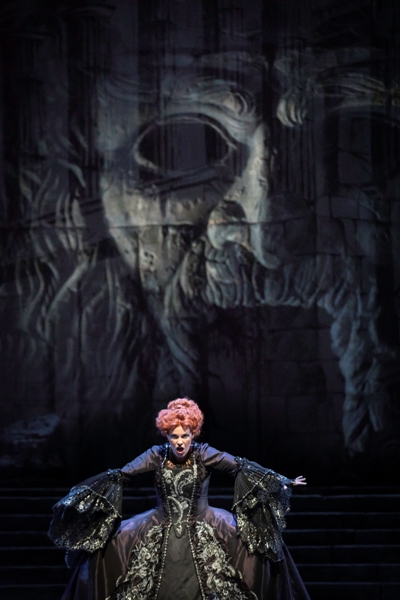
Erin Wall makes a meal of her role as the spurned princess Elettra, one of the several mortals at odds with the gods.
And the crowd got a superior performance of Mozart’s early masterpiece (1781) to further buoy that euphoria.
The young Wolfgang’s successful attempt to breathe new dramatic life into the stodgy conventions of 18th-century opera seria hinges dramatically on a happy compromise between gods and mortals that is very long in coming but is worth waiting for.
And compromise, if you will, also lies at the heart of the deal struck on Oct. 14 when musicians of the Lyric Opera Orchestra ratified a new labor agreement, ending a five-day strike that put the season on hold only three days after it had begun, on Oct. 6, with Puccini’s “La bohème.”
In a statement, the musicians said their weekly salary would increase by 5.6 percent in the course of the three-year contract, and that they would be guaranteed five additional weeks of work in the spring of 2020 to perform Wagner’s “Ring” cycle three times, festival-style, in its entirety; the so-called “Ring 2020” had been planned years before, but management warned it could be cut. Also, the salary for musicians who play in Lyric’s annual run of a musical is to increase by 6.6 percent.
In return, the agreement will reduce the number of guaranteed weeks of work for the orchestra musicians to 22 from 24, and will cut the number of full-time orchestra members through attrition to 70 from 74 (management had sought to reduce it to 69). Lyric has declined comment on the new contract.
(Three performances were canceled in the course of the five-day labor action, two of “La bohème” and the scheduled opening performance of “Idomeneo” on Oct. 13. Lyric will make up the strike-canceled performances of “La bohème” by adding two performances in 2019 – see details at the end of this story. Patrons who had previously bought tickets to the performances that were canceled may exchange for the added dates, or for other performances during the run. The single strike-canceled performance of “Idomeneo” will not be made up.)
For its first “Idomeneo” in 21 years, Lyric has assembled a top-notch cast of American singers and entrusted them to the care of its resident Mozartian, music director Andrew Davis. Today’s foremost Mozart tenor, Matthew Polenzani, in fine vocal form, heads a cast that is supported by conducting, orchestral playing and choral singing of comparable international caliber.
If the contractual nail-biter that took place behind the scenes earlier in the week had a disruptive effect on the performers or the production team, nothing of the sort was evident at this belated opening.
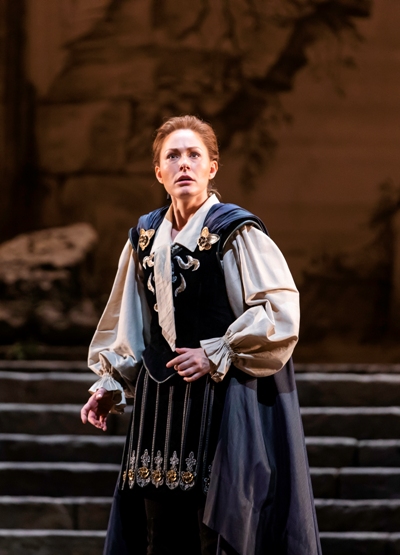
The trouser role of Idamante is a splendid calling-card for Angela Brower in her Lyric debut as the endangered prince.
Composed when Mozart was all of 24, “Idomeneo” is the first fruit of Mozart’s operatic maturity. The mythic classical tale of a Cretan king, Idomeneo, whose safe return from the Trojan War comes at a terrible cost – he rashly vows to sacrifice his son, Idamante, to the wrathful sea god Neptune – makes for a long night at the opera: Even with (discreet) cuts, the Lyric production clocks in at just over 3½ hours, including two intermissions. No wonder the work has graced the Lyric repertoire only twice before, in 1997-98 and for the belated company premiere in 1977.
Once you accept the static nature of this rather stilted narrative of affection and duty, filial and romantic love, and simply give yourself over to the music and performance, you will find a great deal to enjoy. Out of rigid, inherited stage conventions Mozart fashioned something miraculous, full of portents of the stage masterpieces to come.
This marks the Lyric debut of the great director-designer Jean-Pierre Ponnelle’s Metropolitan Opera production of 1982, and it holds up well as staged by revival director David Kneuss. (Lyric goers with long memories will recall that Lyric’s very first performances of “Idomeneo” derived from an even earlier Ponnelle production, from the Cologne Opera.)
The weathered Mycenaean columns and ruined palace walls of the neoclassical unit set, fluidly illuminated by designer Chris Maravich, are dominated by a giant stone head of Neptune that’s a recurring presence in the drama (the god’s eyes open when an offstage voice proclaims the triumph of love at the end).
Despite the opera’s title, it is the role of the Cretan monarch’s son Idamante that is the dramatic fulcrum, and the trouser role served as a splendid calling-card for the Lyric debut of American mezzo-soprano Angela Brower. The singer appeared to be holding back a bit early on, when her bright sound failed to project strongly, but her performance took on increased vocal luster and dramatic conviction as the depth of love between Idamante and the captive Trojan princess Ilia (soprano Janai Brugger) drove the drama. Brower brought out the would-be king’s gentle nobility as well as his heroic gallantry, nailing each of her arias impressively.
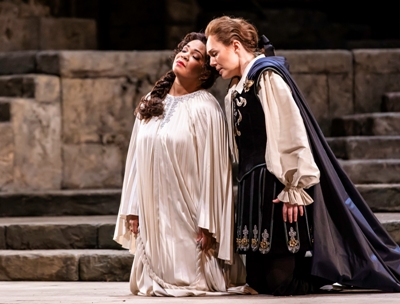
The close-harmony duet of Ilia and Idamante (Janai Brugger and Angela Brower) was one of the evening’s highlights.
Brower and Chicagon native Brugger matched voices in close harmony in their ravishing duet in Act 3, one of the evening’s several highlights. Brugger was physically and tonally lovely as Ilia, Idamante’s future consort. If Brugger at her entrance also sounded as if she hadn’t fully warmed up, she was vocally on track from then on, delivering the creamy purity of timbre as well as the pliable and caressing legato one expects to hear in this role, and she floated the breeze-borne cadences of “Zeffiretti lusinghieri” like a dream.
There is no more musically intelligent exponent of the opera’s title role now before the public than Polenzani. The Evanston native had portrayed the deeply conflicted monarch in this production last year at the Met (it was nationally televised), and he was in equally resplendent form on this occasion, excelling in both his impeccably stylish legato phrasing and firm martial declamation without ever compromising his agility; all three qualities were impressively on display in Idomeneo’s Act 2 “Fuor del mar,” one of Mozart’s most supremely demanding tenor arias, full of coloratura twists and turns that Polenzani dispatched thrillingly.
The princess Elettra (Electra) is the odd character out here, an avenging fury bent on destroying the union of Idamante and Ilia, and having the king’s son for herself. The Canadian-American soprano Erin Wall (like Polenzani, a star alum of the Lyric’s Ryan Center) seized her role debut with cumulative gusto, avoiding the campy flamboyance Carol Vaness brought to the character here in 1997, focusing instead on Elettra’s imperious rage and inner torment in her two arias, especially the third-act mad scene “D’Oreste, d’Aiace,” in which the spurned princess literally sings herself to death. Wall made a meal of it, hands twitching in her death throes, as if auditioning for the title role in Richard Strauss’ 1908 operatic take on the Electra tragedy, which is due back at the Lyric in February.
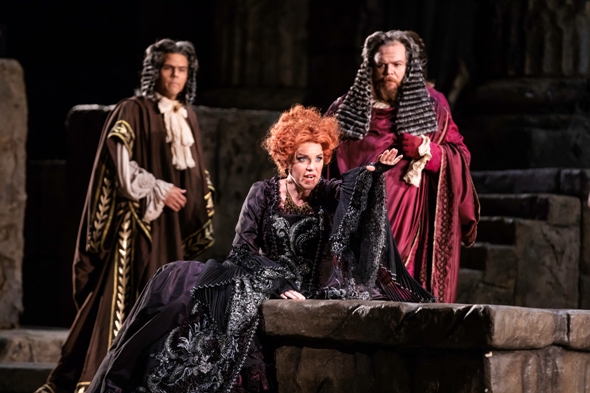
Enraged and in torment, princess Elettra (Erin Wall) is confronted by Arbace (David Portillo, left) and the High Priest (Noah Baetge) in the strong ensemble cast.
Tenor David Portillo, yet another stellar Ryan Center grad, was allowed one of the two arias Mozart wrote for Arbace, Idomeneo’s counselor, and he managed it splendidly, with a sweet and winning plangency of tone. Tenor Noah Baetge made an uncommonly strong company debut as the High Priest. Other smaller parts were capably taken by current Ryan Center members David Weigel, Whitney Morrison, Kayleigh Decker, Josh Lovell and Alan Higgs.
Davis led his first Chicago “Idomeneo” with the stylistic authority and acute musical sensitivity that remain distinguishing features of his Mozart conducting dating all the way back to his Lyric debut with “The Marriage of Figaro” in 1987-88. The orchestra musicians, clearly happy to be back in harness, gave him some of their warmest, most dedicated playing. The chorus plays a key role in this opera – each act ends with a big choral scene – and director Michael Black’s charges acquitted themselves well, freezing in place right on cue when the Cretan populace expressed joy or horror.
Strike-related ticket questions? Only four more performances of ‘Idomeneo’ remain. But as mentioned above, Lyric has made up for the strike-canceled performances of “La boheme” by tacking on two more performances of the Puccini favorite in the new year – on Jan. 29 (matinee) and Jan. 31. Patrons who had previously bought tickets to the performances that were canceled may exchange into the added dates, or opt for other performances during the run.
The added performances are also now on sale to the general public (call 312-827-5600 or order from the website calendar). Casting for those performances will be announced later.
John von Rhein recently retired as classical music critic of The Chicago Tribune after a tenure of more than 40 years.
Related Links:
- “Idomeneo” location, dates and times: Details at TheatreInChicago.com
- Lyric’s “La bohème” continues: Read the review at ChicagoOntheAisle.com


